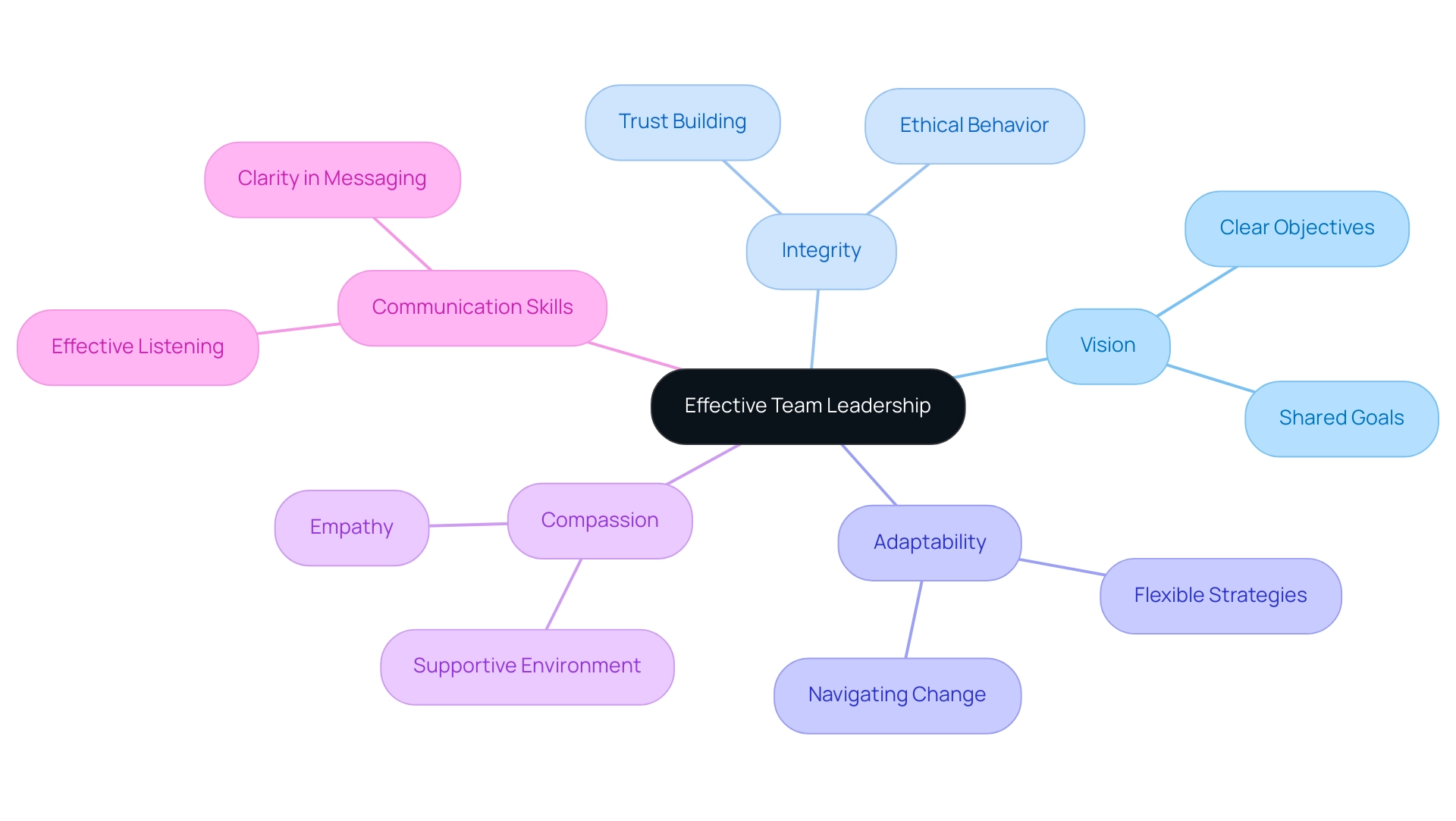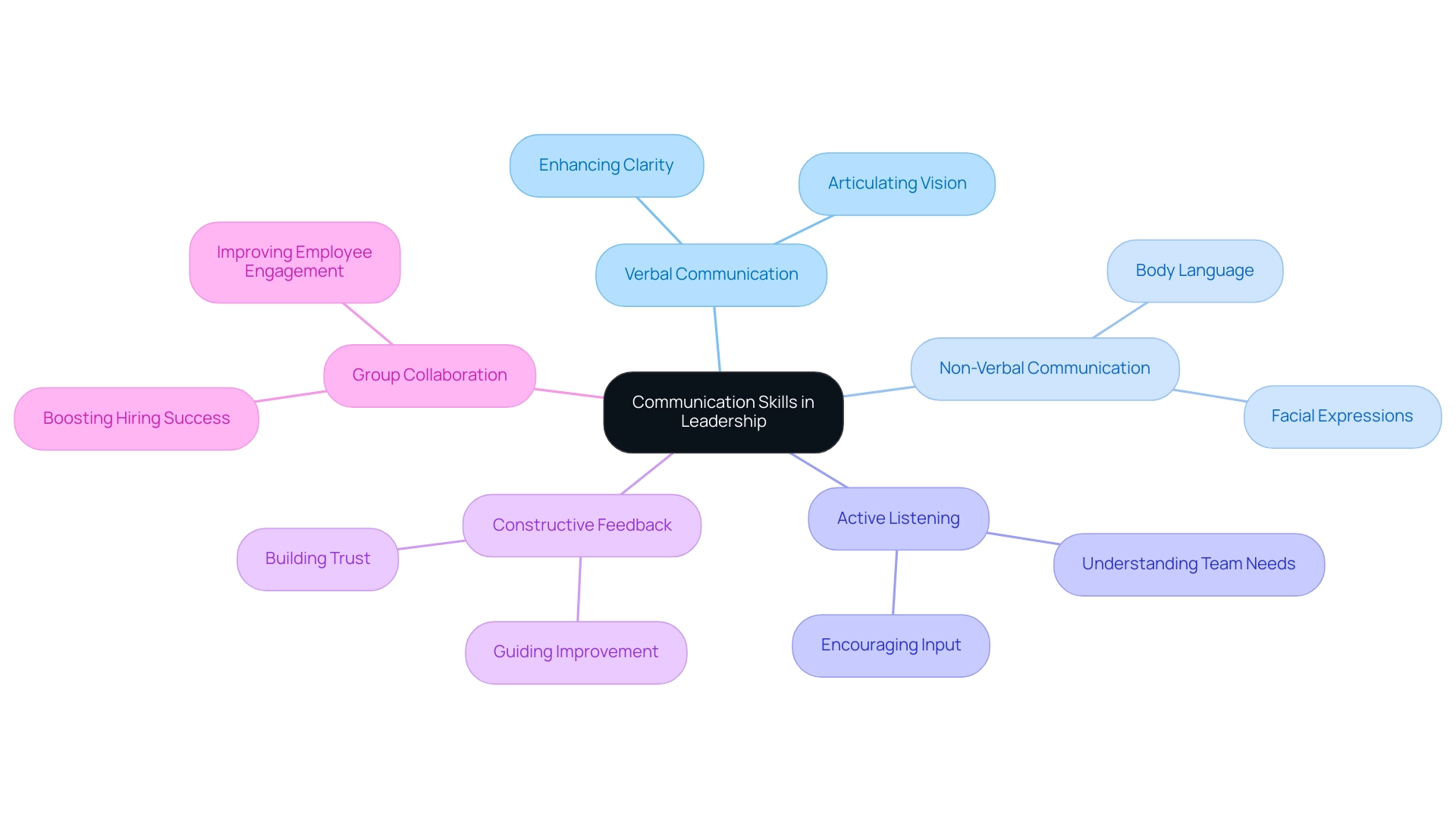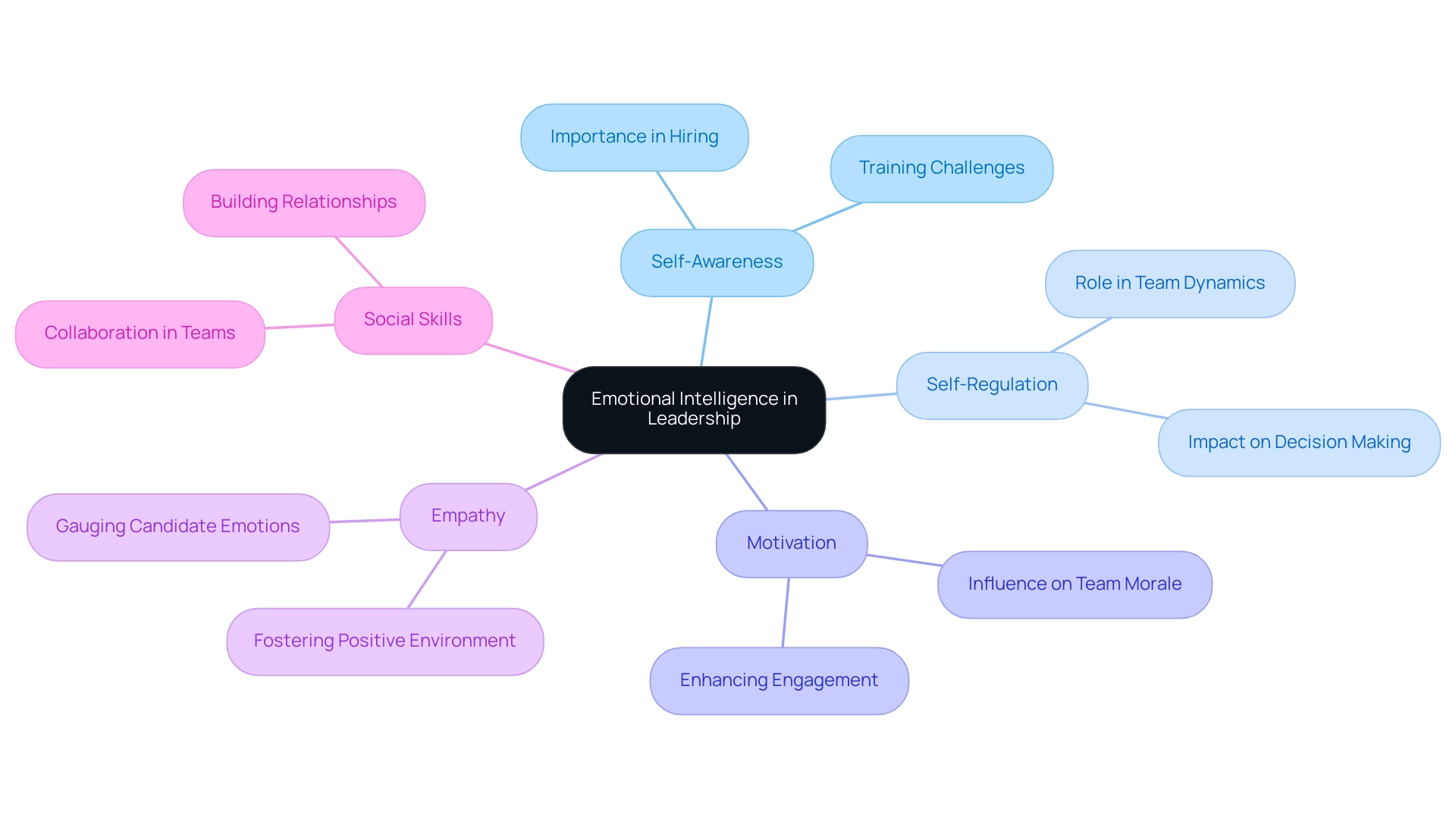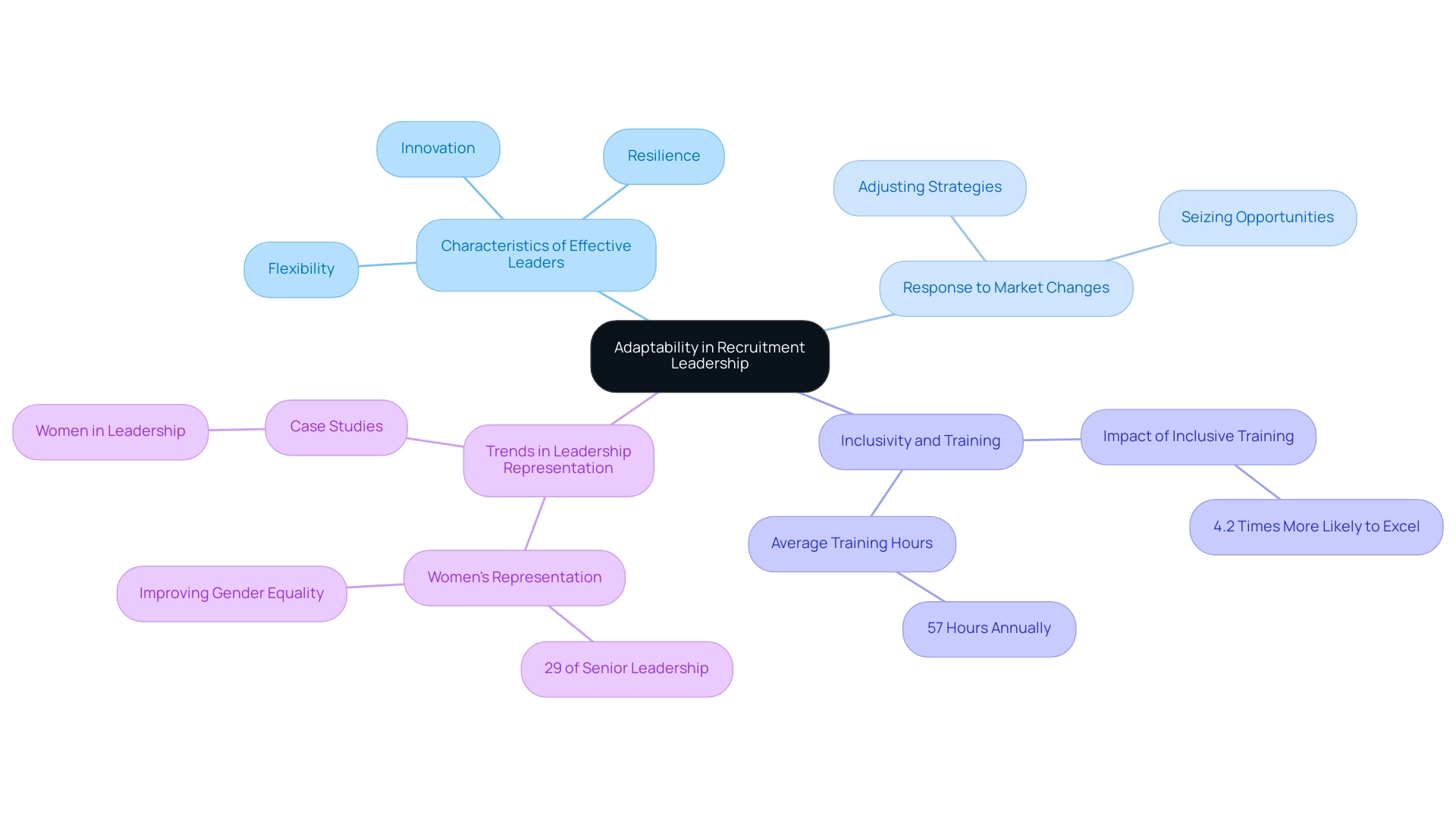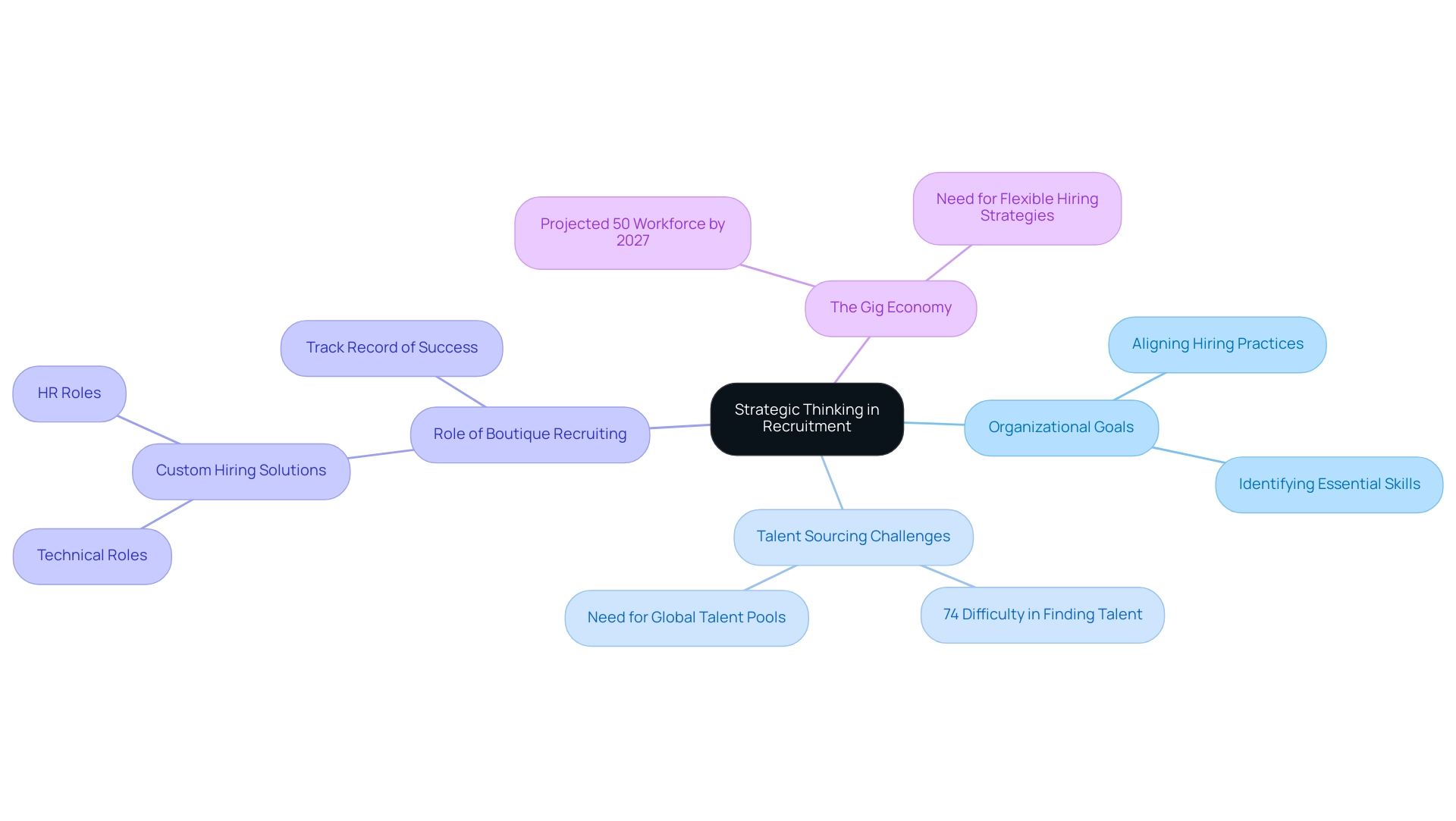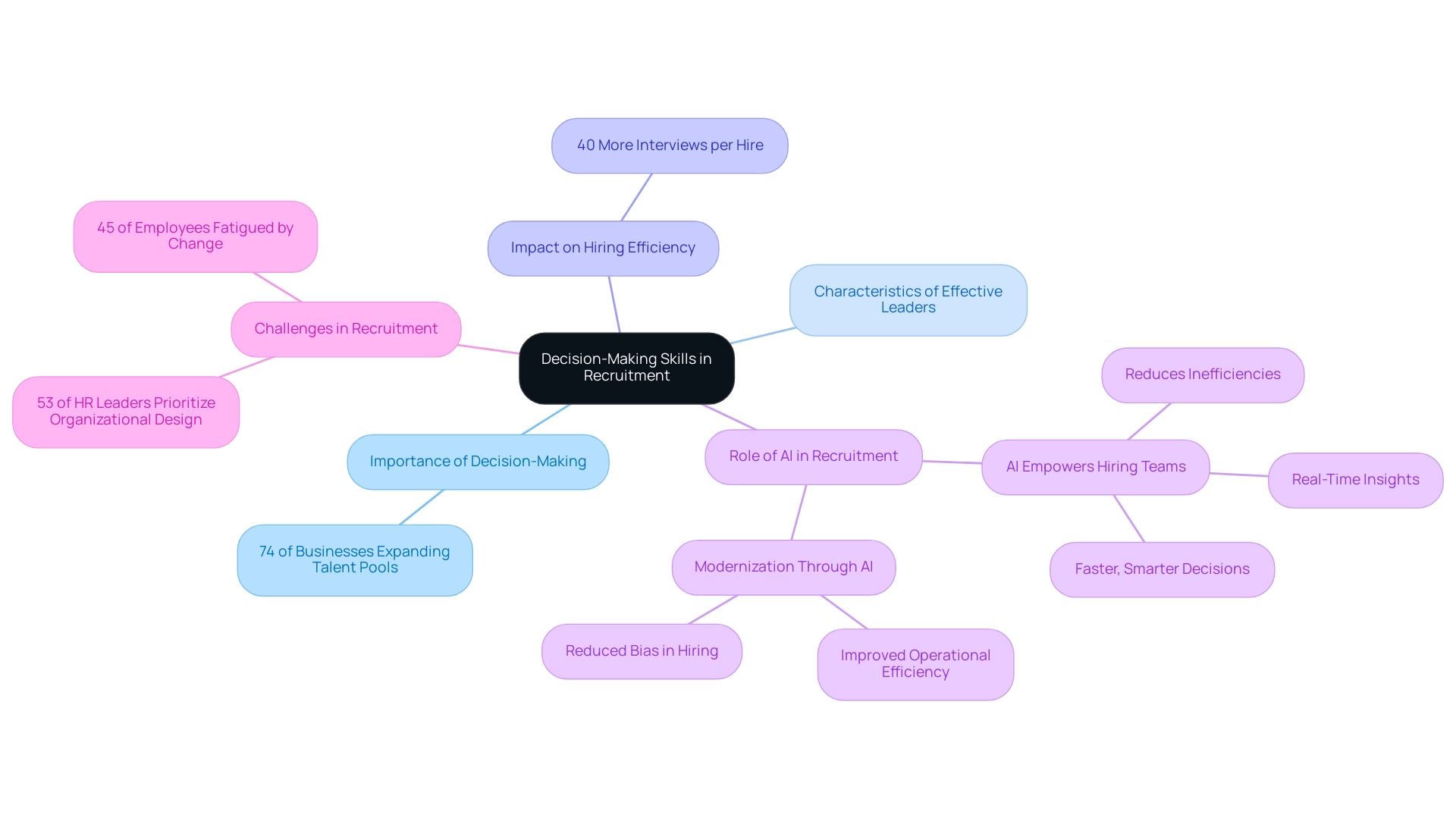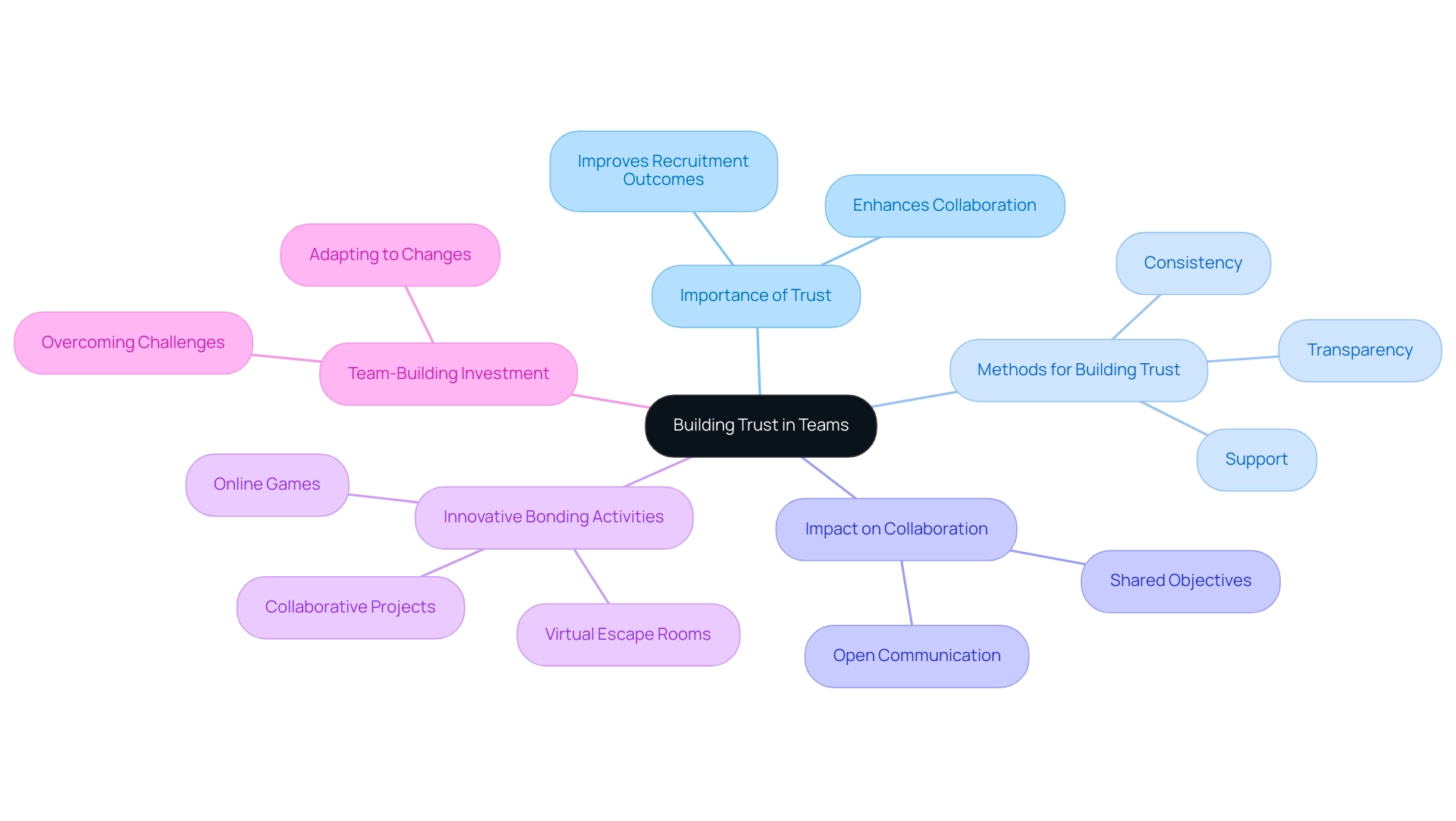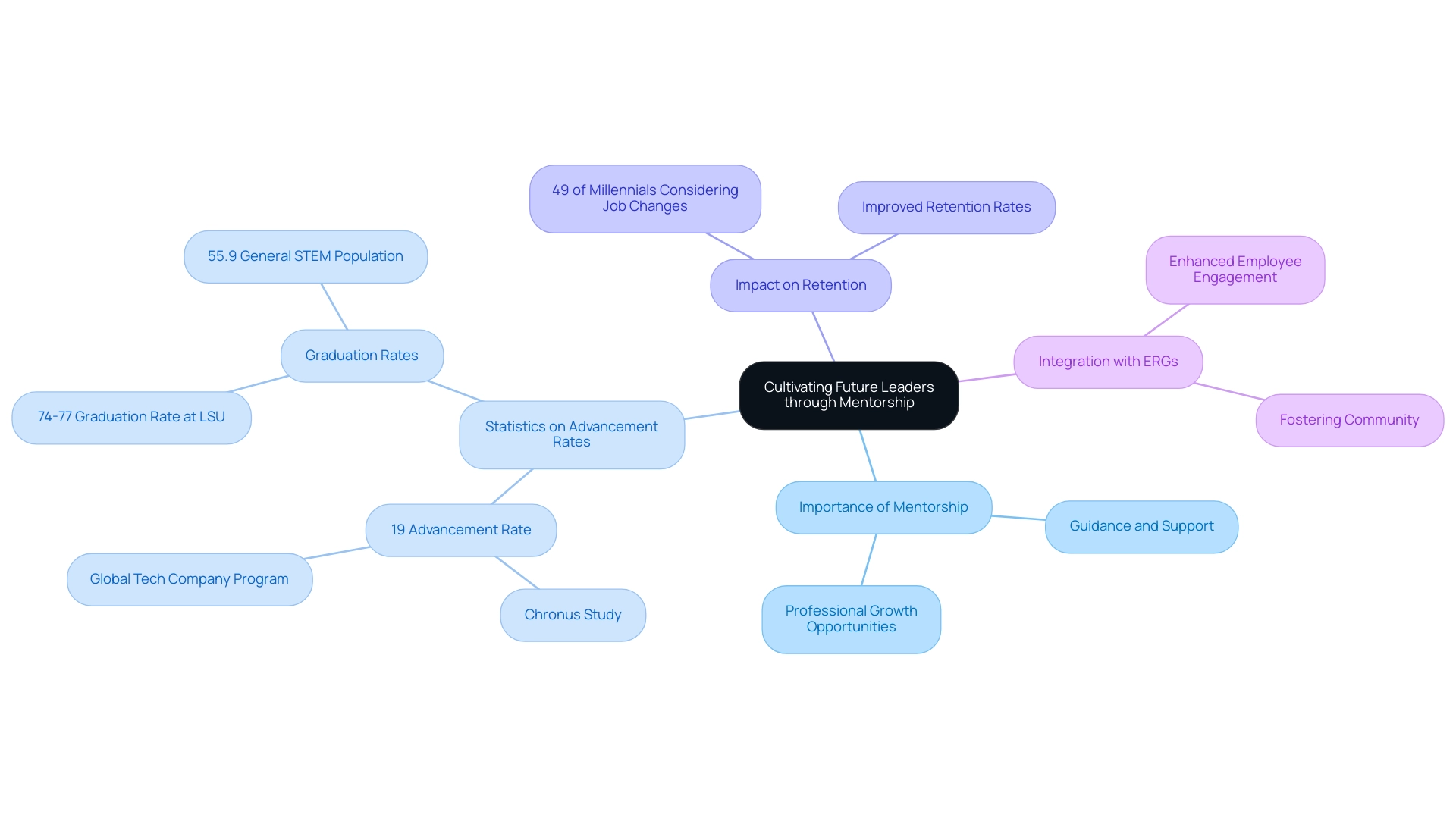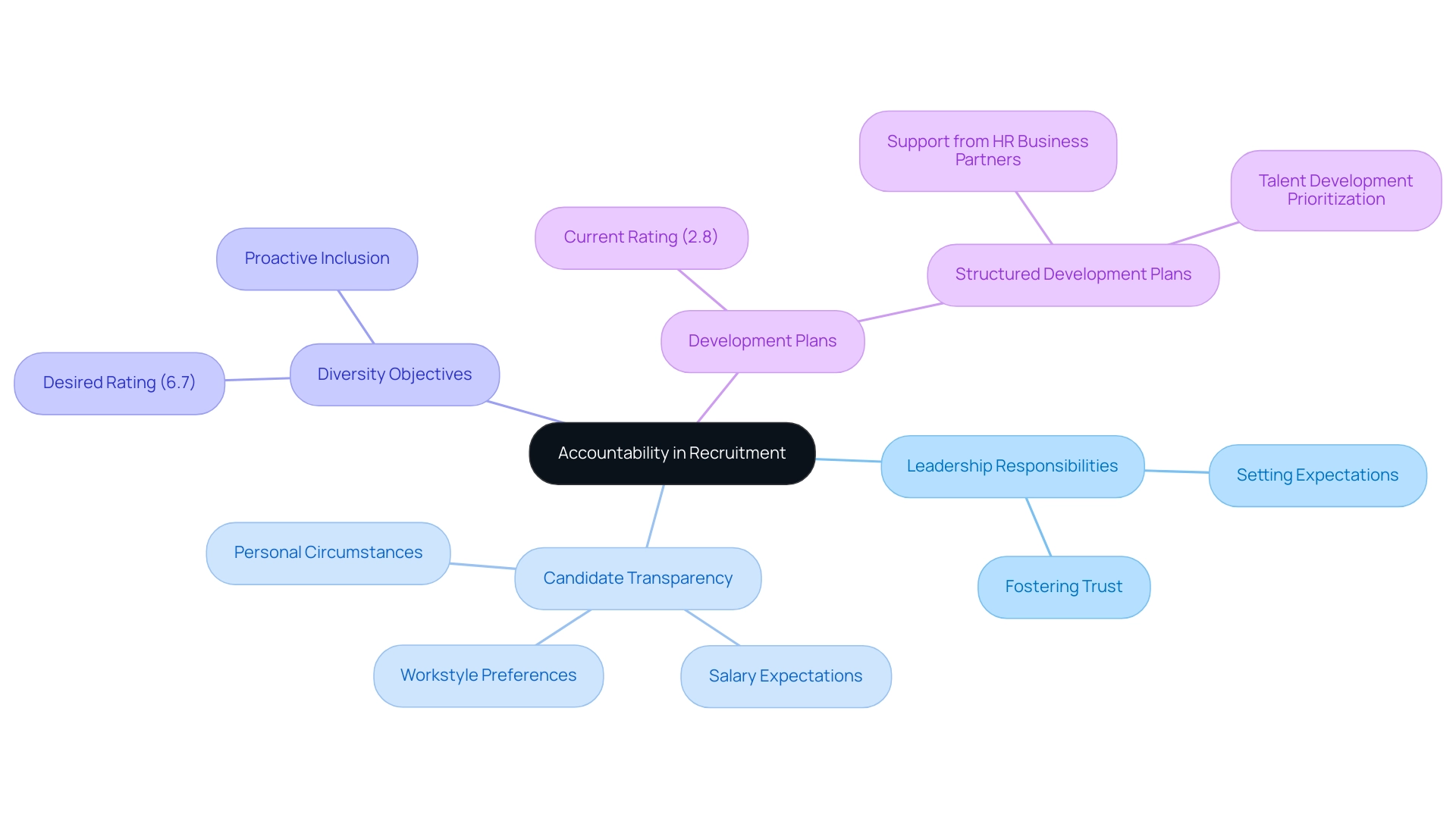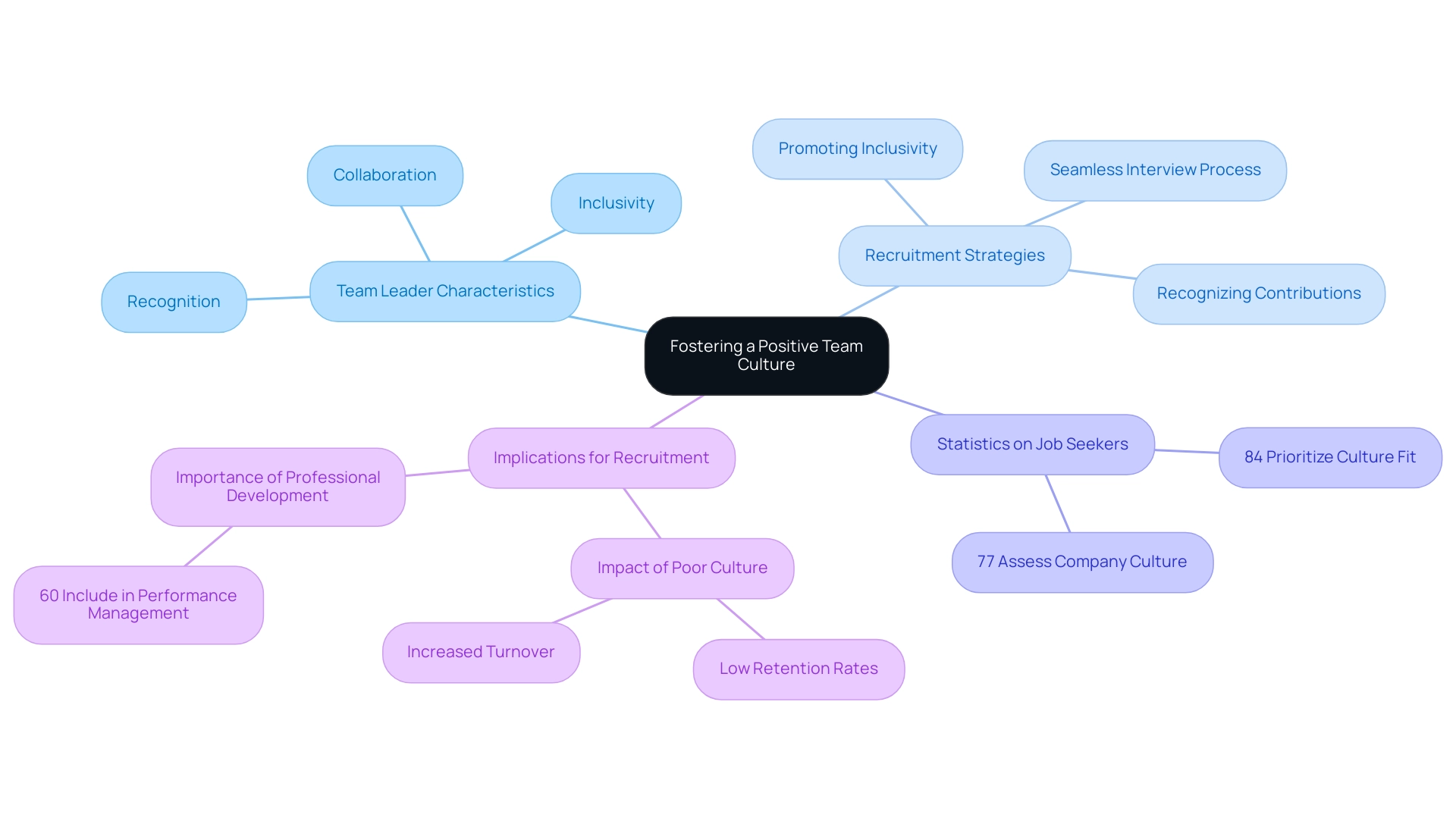Overview
The article outlines ten essential characteristics of team leaders that drive success in recruitment, emphasizing traits such as:
- Vision
- Integrity
- Adaptability
- Strong communication skills
These traits are vital as they foster trust, enhance team engagement, and align hiring practices with organizational goals. Ultimately, they lead to improved recruitment outcomes and a positive workplace culture.
Consider the impact of these qualities: how do they shape the dynamics of a team? As organizations navigate the complexities of recruitment, understanding the role of effective leadership becomes paramount.
Key Highlights:
- Effective team leadership in recruitment is characterized by vision, integrity, adaptability, compassion, and strong communication skills.
- A clear vision helps align team efforts and fosters a sense of purpose among members.
- Integrity builds trust, enabling team members to feel valued and empowered.
- Leaders who inspire their teams can significantly enhance performance and engagement.
- Adaptability is crucial as 57% of U.S. hiring managers lack remote work policies, necessitating flexible leaders.
- Effective communication skills are linked to improved shareholder returns and employee engagement.
- Emotional intelligence (EQ) enhances hiring decisions by assessing candidates’ cultural fit and team dynamics.
- Strategic thinking aligns hiring practices with organizational goals, addressing current and future talent needs.
- Decision-making skills are critical for recruitment leaders, especially in a landscape increasingly driven by data and AI.
- Building trust through transparency and accountability fosters collaboration and improves recruitment outcomes.
- Mentorship is vital for developing future leaders and enhancing retention rates in organizations.
- Cultivating a positive team culture is essential for attracting and retaining top talent, with 77% of job seekers assessing company culture before applying.
Introduction
In the competitive landscape of recruitment, effective leadership is not merely a luxury; it is an absolute necessity. As organizations strive to attract and retain top talent, the qualities that define successful leaders have come into sharper focus. Key characteristics such as vision, integrity, adaptability, and emotional intelligence are now essential for leaders navigating the complexities of modern hiring practices.
With a growing emphasis on communication skills and accountability, leaders are tasked with fostering a positive team culture that resonates with today’s candidates. What does it take to lead effectively in such a dynamic environment? This article delves into the critical traits that underpin effective leadership in recruitment, offering insights into how these attributes can enhance team cohesion, drive recruitment success, and ultimately shape the future of talent acquisition.
Are you ready to elevate your leadership approach in recruitment?
Defining Effective Team Leadership: Key Characteristics
Effective leadership in recruitment is fundamentally anchored in several pivotal characteristics of team leaders, including vision, integrity, adaptability, compassion, and robust communication skills. A leader must articulate a clear vision, steering team members to comprehend their roles in achieving collective objectives. This clarity not only aligns efforts but also cultivates a profound sense of purpose among group members.
Integrity holds equal importance, as it nurtures trust within the team. When individuals demonstrate integrity and ethical behavior, they create an environment where team members feel valued and empowered to contribute their best efforts. Furthermore, the ability to inspire is paramount; leaders who motivate their teams can significantly enhance performance and engagement.
As we approach 2025, the relevance of these traits is underscored by recent findings, which reveal that 57% of U.S. hiring managers lack policies to support remote work. This highlights the necessity for adaptable individuals capable of navigating evolving work environments. Additionally, a notable 40% of employees express a desire for stricter regulations on online collaboration tools, indicating that effective managers must prioritize work-life balance and team well-being through strong communication skills.
Boutique Recruiting recognizes the critical role of effective guidance in hiring, particularly for specialized legal and technical positions such as General Counsel, Attorney, Chief Technology Officer, and Engineer. Our tailored hiring solutions are designed to meet the unique needs of companies across various sectors, ensuring that leaders can attract and retain top talent. Expert insights further bolster these assertions.
Imed Bouchrika, Co-Founder and Chief Data Scientist, emphasizes that “the growth of management skills’ impact on companies is remarkable, posting a 25% increase in organizational outcomes in one study.” This statistic illustrates the profound influence that strong leadership traits can exert on group performance in recruitment.
Case studies reveal that organizations frequently grapple with unnecessary meetings, which can sap productivity. By optimizing meeting frequency, format, and purpose, supervisors can enhance decision-making and overall team effectiveness. This reassessment of meeting strategies underscores the adaptability and strategic thinking that effective leaders must embody, enabling them to mitigate the challenges highlighted in the case study.
Ultimately, the amalgamation of vision, integrity, and the capacity to inspire—coupled with adaptability and compassion—constitutes essential characteristics of team leaders that drive hiring success and foster a high-performing culture. Leaders who embody these traits are better equipped to navigate the complexities of hiring, ensuring that their teams thrive in a competitive landscape, especially with the support of Boutique Recruiting’s customized solutions tailored for niche positions. Reach out to us to explore how we can assist you with your hiring needs.
The Role of Communication Skills in Leadership Success
Effective communication skills are among the essential characteristics of team leaders, particularly in the recruitment sector. Leaders must excel in both verbal and non-verbal communication to promote clarity and understanding among group members. This encompasses active listening, providing constructive feedback, and facilitating discussions that invite group input.
By fostering an atmosphere of open communication, supervisors not only enhance group collaboration but also significantly boost hiring success.
Statistics indicate that managers who excel in communication are accountable for 50% greater shareholder returns, more effective strategy and change initiatives, and improved employee engagement. This highlights the significance of communication in managerial roles. As we approach 2025, the emphasis on communication skills in recruitment management has never been more pronounced. Organizations are increasingly seeking individuals who can effectively navigate the complexities of talent acquisition.
Moreover, effective communication directly influences recruitment outcomes. Assessing team communication effectiveness involves asking insightful questions about misunderstandings and the comfort level of team members in expressing their ideas. This evaluation can pinpoint strengths and areas for improvement, guiding individuals in refining their communication strategies, as highlighted in the case study titled ‘Assessing Team Communication Effectiveness.’
Successful hiring managers often cite strong communication abilities as a key differentiator. These individuals not only articulate their vision clearly but also engage their teams in meaningful conversations, fostering a culture of collaboration that enhances hiring efforts. The impressive track record of Boutique Recruiting exemplifies this approach; their commitment to understanding both client needs and candidate aspirations has established them as a trusted partner in the hiring landscape.
Boutique Recruiting’s tailored hiring solutions, particularly for niche legal positions and technical roles, further demonstrate their expertise in sourcing high-quality talent across diverse industries in the U.S. and Canada.
In summary, the significance of communication skills as essential team leader characteristics for hiring leaders cannot be overstated. As the hiring landscape evolves, those who prioritize effective communication and embrace transparency and authenticity—such as being forthcoming about workstyle preferences and salary expectations—will be better positioned to attract and retain top talent, ultimately driving organizational success. This is especially pertinent for HR leaders in financial companies, who must navigate the complexities of hiring while ensuring alignment with organizational goals.
Emotional Intelligence: A Cornerstone of Effective Leadership
Emotional intelligence (EQ) serves as a cornerstone of effective leadership, particularly in the context of team leader characteristics during the hiring process. Comprising self-awareness, self-regulation, motivation, empathy, and social skills, EQ enables leaders to adeptly navigate their own emotions and those of their colleagues. This skill set is crucial in hiring, where the ability to gauge candidate emotions can significantly influence decisions and foster a positive team environment.
Research indicates that organizations neglecting the development of emotional intelligence within their workforce may face dire consequences, including diminished productivity and stifled innovation. Alarmingly, only 42% of organizations currently provide training aimed at enhancing emotional intelligence skills among employees, highlighting a critical gap in leadership development.
In 2025, the incorporation of emotional intelligence into hiring leadership is more vital than ever. Team leader characteristics, such as harnessing EQ, can create a more resilient workforce. Case studies reveal the challenges many companies face in implementing emotional intelligence training. While the importance of EQ is recognized, many organizations have yet to adapt their training practices, particularly for non-supervisory roles, increasingly impacted by automation.
The case study titled ‘Challenges in Implementing Emotional Intelligence Training‘ illustrates that despite acknowledging the necessity for emotional intelligence, many companies find it difficult to integrate it into their training frameworks effectively.
The effect of emotional intelligence on hiring success cannot be overstated. Leaders who exhibit strong team leader characteristics and high EQ are better positioned to make informed hiring decisions, as they can assess not only the technical qualifications of candidates but also their cultural fit within the organization. This holistic method of hiring enhances team morale and cohesion, highlighting essential team leader characteristics that ultimately drive organizational success.
Boutique Recruiting’s custom recruitment solutions for roles such as Chief Technology Officer, Engineer, Solution Architect, Systems Administrator, and HR Director across diverse industries in the U.S. and Canada exemplify how a focus on emotional intelligence can lead to better hiring outcomes, establishing the firm as a trusted recruiting partner.
Statistics further underscore the importance of emotional intelligence in leadership. For instance, the average EQ VAS score in India is 75.18, suggesting a strong foundation for emotional intelligence among executives. However, the challenge remains to cultivate these skills across all levels of an organization.
Examples abound of individuals who have successfully leveraged emotional intelligence to refine their hiring processes. By prioritizing EQ in their hiring strategies, these leaders have not only improved candidate selection but also fostered a more engaged and motivated workforce. As the landscape of hiring continues to develop, the role of emotional intelligence will undoubtedly remain a key differentiator for effective guidance, particularly through the personalized talent acquisition solutions offered by Boutique Recruiting.
To learn more about how Boutique Recruiting can assist with your custom hiring needs, contact us today.
Adaptability: Navigating Change in Recruitment Leadership
In the dynamic field of hiring, adaptability stands out as a critical characteristic of effective leadership. Recruitment leaders must be equipped to adjust their strategies in response to shifting market trends, technological innovations, and internal organizational changes. This flexibility not only aids in overcoming challenges but also empowers hiring teams to seize emerging opportunities by leveraging essential team leader characteristics.
Leaders who champion change exemplify characteristics that foster a culture of innovation and resilience, which are vital for navigating the complexities of today’s hiring landscape.
Statistics indicate that organizations embracing inclusive training are 4.2 times more likely to excel compared to those that limit development to management levels. This underscores the necessity of flexibility in managerial roles, particularly in hiring, where characteristics such as the ability to pivot can significantly influence success. For instance, the ongoing trend of increasing women’s representation in leadership roles—currently 29% of senior leadership positions globally—illustrates the gradual shift towards greater inclusivity and adaptability in leadership dynamics.
This trend is mirrored in Boutique Recruiting’s commitment to understanding the unique needs of both employers and candidates, resulting in numerous satisfied clients and candidates, thereby establishing the firm as a trusted recruiting partner across diverse industries in the U.S. and Canada.
Moreover, expert insights assert that adaptability is not merely a reactive measure; it is a proactive strategy. As Dorie Clark, a consultant and adjunct executive-education professor at Duke University, articulates, “The essence of adaptability is being able to recognize that if something goes wrong, it’s not a mortal wound.” This perspective is crucial for hiring managers who must navigate the intricacies of talent acquisition in 2025 and beyond.
Successful hiring leaders embody team leader characteristics by implementing innovative hiring strategies that align with evolving industry standards. For example, firms that have adopted flexible hiring practices report higher satisfaction rates among both clients and candidates, reinforcing the notion that adaptability is key to success in this domain. Furthermore, with staff receiving an average of 57 hours of training annually, continuous improvement in leadership adaptability is essential for enhancing hiring strategies.
As the landscape continues to evolve, the ability to embrace change will distinguish effective individuals in the hiring sector, akin to Boutique Recruiting’s tailored approach to addressing the specific needs of its clients through custom searches that are unique to company requirements, industry, and locations. Boutique Recruiting specializes in roles such as Chief Technology Officer, HR Director, and other key positions, ensuring a comprehensive understanding of the market. Contact us to learn more.
Strategic Thinking: Aligning Recruitment with Business Goals
Strategic thinking is crucial for hiring managers who seek to align their team’s efforts with overarching business objectives. This necessitates a profound understanding of the organization’s goals and the identification of essential skills required to achieve them. By formulating targeted hiring strategies, executives can effectively attract the right talent that not only fills immediate vacancies but also supports long-term organizational growth.
In today’s competitive landscape, where 74% of businesses encounter difficulties in sourcing suitable talent, the capacity to foresee future hiring needs is paramount. Recruitment leaders must establish a robust talent pipeline that aligns with the evolving demands of their organizations. This proactive strategy not only addresses current staffing shortages but also positions the company for future success.
Boutique Recruiting, with its impressive track record in delivering custom hiring solutions for technical and HR roles—including Chief Technology Officer, Engineer, Solution Architect, Systems Administrator, IT Help Desk, CHRO, Chief People Officer, HR Director, HR Generalist, and Compensation & Benefit Manager—across diverse industries in the U.S. and Canada, is exceptionally equipped to assist organizations in overcoming these challenges.
Expert insights underscore the necessity of integrating strategic thinking into hiring practices. As industry contributor Joseph Folkman articulates, “Take a look at these companion behaviors, incorporate them into your routines, and resolve to be the individual who can see and communicate the whole picture.” This emphasizes the imperative for executives to ensure that hiring initiatives are not only reactive but also strategically aligned with business objectives.
Furthermore, the rise of the gig economy, projected to see gig workers comprise 50% of the workforce by 2027, calls for a reevaluation of traditional hiring models. Recruitment professionals must adapt their strategies to accommodate this shift, ensuring that their approaches are flexible and responsive to the changing landscape of work. The growth of the gig economy highlights the critical need for innovative hiring strategies that can effectively integrate gig workers into the workforce.
Examples of effective hiring managers illustrate how aligning selection practices with business goals can identify essential team leader characteristics that enhance organizational performance. By fostering a culture of strategic thinking within their teams, these individuals not only improve their hiring outcomes but also exemplify key team leader traits that contribute to the overall success of their organizations. Boutique Recruiting’s dedication to understanding client needs and delivering high-quality candidates through tailored searches positions it as a trusted partner in achieving these objectives.
Contact us to learn more.
Decision-Making Skills: Driving Recruitment Success
Decision-making abilities are paramount for recruitment professionals, especially in the context of targeted recruitment services for accounting and marketing positions provided by Boutique Recruiting. These leaders often confront the challenge of making swift and informed choices regarding candidates. In 2025, the capacity to analyze data effectively and weigh various options is more critical than ever, particularly as 74% of businesses plan to expand their talent pools globally, driven by the rise of remote work opportunities.
Leaders who excel in decision-making embody essential characteristics that not only enhance their team’s efficiency but also ensure that the right candidates are selected for their organizations.
The impact of decision-making on hiring efficiency cannot be overstated. For instance, organizations that leverage data-driven insights in their hiring processes report conducting 40% more interviews per hire in 2024 compared to 2021. This increase in efficiency is largely attributed to individuals who prioritize informed decision-making, allowing them to optimize their hiring processes and reduce time-to-fill rates.
Effective decision-making in recruitment involves considering both immediate needs and long-term implications, particularly concerning team leader characteristics for high-demand roles in accounting, marketing, finance, and technology. Leaders must navigate complexities and inefficiencies in talent acquisition, as highlighted by recent surveys indicating that many HR leaders are seeking modern, AI-driven solutions to enhance operational efficiency. As Rebecca Carr, CEO of Boutique Recruiting, asserts, “AI doesn’t just automate—it empowers hiring groups by providing real-time insights, reducing inefficiencies, and enabling faster, smarter decisions at every stage of the hiring process.”
These solutions empower hiring teams by offering real-time insights, alleviating administrative burdens, and facilitating quicker, more intelligent decisions at every stage of the hiring process.
Case studies illustrate the transformative impact of decision-making abilities in hiring management. For example, organizations that have embraced AI-driven talent acquisition strategies have reported substantial improvements in their hiring processes, including reduced bias and enhanced candidate matching. This modernization reflects a broader trend where 53% of HR leaders emphasize organizational design and change management, recognizing that team leader characteristics are vital for effective decision-making in navigating the evolving hiring landscape.
Moreover, with 45% of employees feeling fatigued by change, effective leadership is crucial in managing these transitions smoothly.
In conclusion, the significance of decision-making abilities in hiring cannot be overlooked. Leaders at Boutique Recruiting who utilize data analysis and make informed hiring decisions not only elevate their group’s performance but also contribute to the overall success of their organizations in attracting and retaining top talent.
Building Trust: The Foundation of Team Cohesion
Establishing trust among a hiring group is crucial for promoting collaboration and cultivating a positive work atmosphere. Leaders can cultivate this trust by demonstrating transparency, consistency, and support. Research shows that 52% of employees believe that rewards are not aligned with organizational goals, emphasizing the necessity for leaders to create clear expectations and recognition systems that connect with members.
When trust is present, group members are more inclined to share ideas, provide constructive feedback, and collaborate towards common objectives, which significantly enhances recruitment outcomes.
In 2025, the dynamics of group cohesion have evolved, necessitating innovative approaches to trust-building. Recruitment specialists are increasingly utilizing virtual bonding activities, such as online games and collaborative projects, to strengthen connections among remote members. These initiatives not only promote engagement but also reinforce a culture of trust, which is vital for effective collaboration.
As noted by Ron Friedman, PhD, “The best workplaces are those where trust is built through transparency and open communication.”
Expert opinions underscore the importance of transparency in recruitment leadership. By openly communicating objectives, challenges, and achievements, individuals in charge can cultivate an atmosphere where group members feel appreciated and empowered. This transparency is essential for fostering trust, as it promotes open dialogue and a collective commitment to the group’s mission.
Case studies show that hiring managers who emphasize trust-building experience noticeable advantages in group performance. For instance, organizations that reassess their meeting practices to enhance efficiency and engagement report improved decision-making and productivity. By concentrating on trust and collaboration, hiring groups can navigate challenges more effectively and achieve superior results.
Investing in team-building is essential for adjusting to shifts in working models and tackling challenges encountered by groups, which helps develop team leader characteristics that ensure leaders are well-equipped to cultivate a unified and high-performing unit.
Mentorship and Development: Cultivating Future Leaders
Mentorship and development are critical characteristics of effective team leaders, particularly in the hiring sector. Leaders must prioritize mentoring their members, as this reflects essential qualities that provide guidance, support, and opportunities for professional growth. This investment not only enhances individual performance but also establishes a robust pipeline of future executives capable of driving hiring success.
The significance of mentorship is underscored by compelling statistics: participants in mentoring programs experience a 19% advancement rate compared to their non-participating peers (Chronus). Additionally, a mentoring program at LSU demonstrates that 74-77% of students graduate compared to only 55.9% of the general STEM student population, emphasizing how structured mentorship can enhance career trajectories and foster a culture of collaboration within groups. With 49% of Millennials contemplating job changes due to limited career advancement opportunities, the urgency for effective mentorship becomes even more pronounced.
Case studies reveal that integrating Employee Resource Groups (ERGs) with mentoring initiatives can significantly enhance employee engagement and satisfaction. Organizations that have successfully implemented ERGs alongside mentoring programs report improved retention rates and a more engaged workforce. These groups not only assist various demographics but also cultivate a sense of community, which is crucial for nurturing future influencers in hiring.
As we approach 2025, the importance of mentorship in developing team leader characteristics within hiring groups will be vital. A global tech company that launched a voluntary mentoring program in 2021 saw a 19% advancement rate among participants, indicating positive impacts on internal networks and collaboration. Organizations that implement effective mentorship programs are likely to see improved retention rates and a more engaged workforce, ultimately leading to greater hiring success.
By cultivating an environment where mentorship flourishes, leaders can ensure that their groups are well-prepared to navigate the challenges of the evolving job market.
Accountability: Ensuring Transparency in Recruitment
Accountability stands as a fundamental pillar of effective leadership in hiring. Leaders are tasked with not only holding themselves accountable but also ensuring their members are responsible for their actions and decisions. This accountability manifests through transparency in the hiring process, where setting clear expectations and consistently following through on commitments is essential.
Candidates are encouraged to embrace transparency by being forthcoming about their workstyle preferences, salary expectations, and unique personal circumstances, including their desired work arrangements, such as hybrid or remote work. This level of openness helps build trust and enables hiring managers to assess candidates’ suitability for roles effectively.
Statistics reveal that the desired rating for managers who build teams reflecting company diversity objectives is 6.7. This highlights the necessity for individuals in positions of authority to be proactive in fostering inclusive environments. After all, accountability in recruitment management directly influences the ability to meet these diversity goals.
Furthermore, a recent report highlights a concerning trend: the current rating for ensuring high-potential individuals have quality development plans is only 2.8. This indicates a substantial gap between the current state and desired outcomes. How can organizations bridge this gap? The lack of structured development increases performance and succession risks within organizations, emphasizing the necessity for individuals in charge to implement robust development plans supported by HR business partners.
Expert opinions reinforce this perspective. Rajesh Chennattu Sasidharan Nair, an assistant general manager at Amazon Pathways, notes that critically evaluating accountability processes in terms of fairness is vital for restoring employee trust. He emphasizes that when individuals perceive their evaluations as arbitrary, they feel undervalued.
Thus, fostering meaningful and transparent conversations is crucial for building trust in the accountability process, which is essential for effective leadership in hiring.
Examples of hiring leaders promoting transparency and accountability abound. These practices lead to improved outcomes. By prioritizing accountability and implementing structured development plans, organizations can not only improve their hiring processes but also foster a culture that emphasizes team leader characteristics, empowering team members to succeed. This commitment to accountability ultimately drives better hiring decisions and strengthens the overall effectiveness of leadership in staffing.
Boutique Recruiting promotes these principles to ensure a successful hiring process.
Fostering a Positive Team Culture: Attracting Top Talent
Nurturing a positive group culture is essential for attracting and retaining top talent in today’s competitive landscape, where the battle for skilled professionals is fierce. Leaders at Boutique Recruiting must foster an environment that embodies core team leader characteristics such as collaboration, inclusivity, and recognition. Intelligent and resourceful candidates are not merely searching for any job; they are on the lookout for the right position within the right organization.
Research underscores that a stress-inducing and toxic corporate atmosphere can lead to diminished employee wellbeing and low retention rates, highlighting the necessity for a supportive culture. Engaged employees report significantly higher satisfaction levels, while a negative work environment often drives talent to seek better opportunities elsewhere.
Organizations that champion a positive culture not only enhance employee engagement but also bolster their attractiveness to potential candidates. In fact, recent statistics reveal that:
- 77% of job seekers assess a company’s culture prior to applying
- 84% of recruiters prioritize culture fit during the hiring process
This emphasizes the crucial role that team leader characteristics play in cultivating a strong, positive culture, which subsequently influences hiring outcomes and organizational reputation, especially as candidates increasingly evaluate companies just as much as they are evaluated.
To effectively nurture a positive group culture, individuals at Boutique Recruiting should implement strategies that recognize personal contributions and promote inclusivity, reflecting vital team leader characteristics. By doing so, they create an environment where employees feel valued and motivated—an essential factor in attracting top talent. Case studies demonstrate that hiring executives who prioritize inclusivity and recognition are more successful in creating environments that draw diverse candidates, ultimately leading to a more robust talent pool.
Moreover, examples of poor company culture, such as vague values, lack of transparency, and unrealistic work hours, serve as stark reminders of what to avoid.
As we progress through 2025, the focus on positive team culture will remain a pivotal element in successful recruitment strategies. Additionally, it is noteworthy that 60% of organizations incorporate professional development into their performance management programs, further emphasizing the significance of development opportunities in fostering a positive culture. Findings from the case study titled “Workplace Culture and Job Seeker Preferences” indicate that workplace culture significantly influences job seekers, reinforcing the claims regarding the importance of culture in attracting talent.
In this talent war, ensuring a seamless interview process is equally crucial, as candidates remain vigilant for red flags during their interactions with potential employers. Poorly managed interviews can result in lost opportunities, making it imperative for leaders to approach the process with diligence.
Conclusion
Effective leadership in recruitment is characterized by a blend of essential traits that not only enhance team performance but also drive organizational success. Vision, integrity, adaptability, emotional intelligence, and strong communication skills are crucial for leaders navigating the complexities of modern hiring practices. By embodying these qualities, leaders foster a positive team culture that attracts and retains top talent in an increasingly competitive landscape.
The role of adaptability cannot be overstated. Recruitment leaders must be prepared to pivot their strategies in response to changing market dynamics and workforce needs. This flexibility, combined with strategic thinking and effective decision-making, ensures that recruitment efforts align with broader business objectives, ultimately leading to better hiring outcomes. Moreover, leaders who prioritize accountability and transparency create an environment where trust flourishes, enabling team members to collaborate and innovate effectively.
As the recruitment landscape evolves, the emphasis on mentorship and professional development becomes increasingly vital. Leaders who invest in the growth of their team members not only enhance individual performance but also cultivate a robust pipeline of future leaders, ensuring sustained success in talent acquisition.
In summary, the intersection of these leadership qualities forms the foundation for effective recruitment practices. By prioritizing a positive team culture, fostering open communication, and embracing continuous learning, leaders position their organizations to thrive in the ever-changing world of recruitment. The journey toward effective leadership begins with a commitment to these principles, paving the way for a brighter future in talent acquisition. Are you prepared to elevate your recruitment strategy? Reach out today to explore how effective leadership can transform your hiring practices.
Frequently Asked Questions
What are the key characteristics of effective leadership in recruitment?
Effective leadership in recruitment is anchored in vision, integrity, adaptability, compassion, and robust communication skills. Leaders must articulate a clear vision, inspire their teams, and foster an environment of trust and ethical behavior.
How does integrity contribute to effective leadership in recruitment?
Integrity nurtures trust within the team, creating an environment where team members feel valued and empowered to contribute their best efforts, which enhances overall performance and engagement.
Why is adaptability important for leaders as we approach 2025?
With 57% of U.S. hiring managers lacking policies to support remote work, adaptable leaders are essential for navigating evolving work environments and addressing the needs of employees who seek better work-life balance.
How do communication skills impact hiring success?
Effective communication skills promote clarity and understanding among team members, significantly boosting collaboration and hiring success. Managers with strong communication abilities can enhance employee engagement and improve organizational outcomes.
What role does emotional intelligence (EQ) play in effective leadership during the hiring process?
Emotional intelligence enables leaders to navigate their own emotions and those of their colleagues, which is crucial for making informed hiring decisions and fostering a positive team environment.
What challenges do organizations face in developing emotional intelligence among employees?
Many organizations neglect to provide training for emotional intelligence, with only 42% currently offering such programs, leading to diminished productivity and innovation.
How does Boutique Recruiting address the hiring needs for specialized positions?
Boutique Recruiting offers tailored hiring solutions for specialized legal and technical positions, ensuring leaders can attract and retain top talent through customized support.
What evidence supports the importance of strong leadership traits in recruitment?
Research indicates that the growth of management skills can lead to a 25% increase in organizational outcomes, highlighting the profound influence of effective leadership on recruitment performance.
How can leaders optimize meeting strategies to enhance team effectiveness?
By reassessing meeting frequency, format, and purpose, leaders can reduce unnecessary meetings that sap productivity and improve overall decision-making within their teams.
What is the significance of emotional intelligence for hiring leaders in the future?
As the hiring landscape evolves, leaders who prioritize emotional intelligence will be better positioned to attract and retain top talent, driving organizational success and fostering a high-performing culture.
